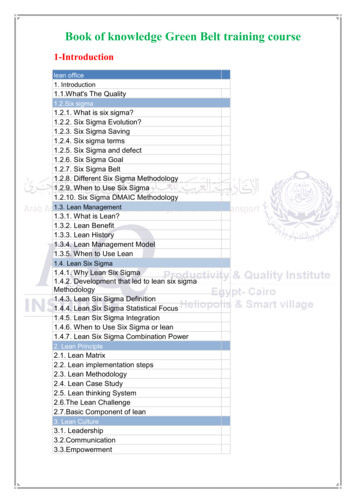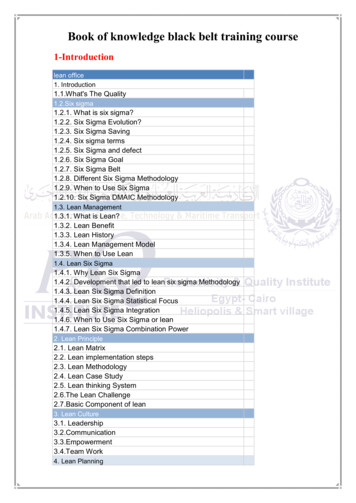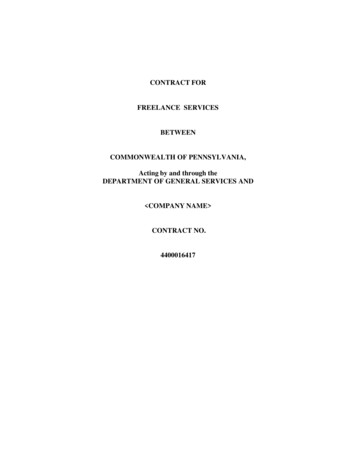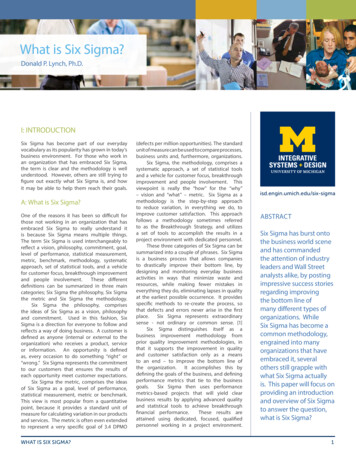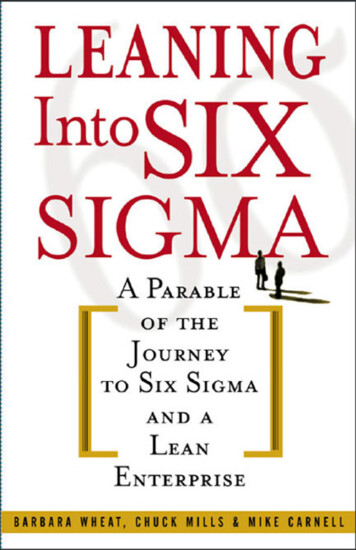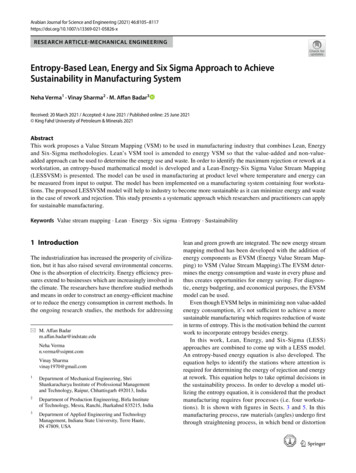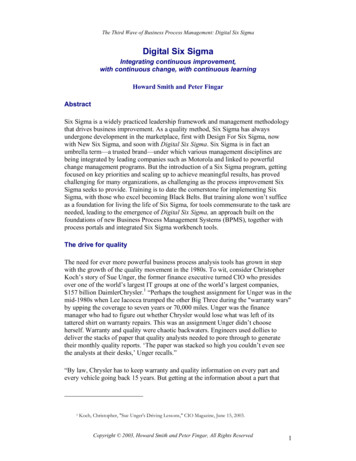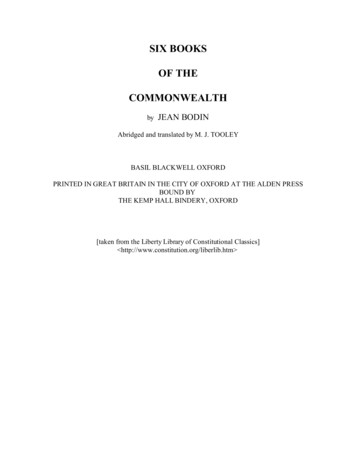
Transcription
SIX BOOKSOF THECOMMONWEALTHbyJEAN BODINAbridged and translated by M. J. TOOLEYBASIL BLACKWELL OXFORDPRINTED IN GREAT BRITAIN IN THE CITY OF OXFORD AT THE ALDEN PRESSBOUND BYTHE KEMP HALL BINDERY, OXFORD[taken from the Liberty Library of Constitutional Classics] http://www.constitution.org/liberlib.htm
CONTENTSINTRODUCTIONI. Biographical Sketch.II. The Argument of the Six books of the Commonwealth.TRANSLATOR'S NOTE.BIBLIOGRAPHICAL NOTE.THE SIX BOOKS OF THE COMMONWEALTH.BOOK I [The chapter numbers in brackets are those of the original French.]The final end of the well-ordered commonwealth [Chapter I] 1Concerning the family [Chapters II-V] 6Concerning the citizen [Chapters VI and VII] 18Concerning sovereignty [Chapter VIII] 25Concerning feudatory and tributary princes [Chapter IX] 36The true attributes of sovereignty [Chapter X] 40BOOK IIOf the different kinds of commonwealth [Chapter I] 51Concerning despotic monarchy [Chapter II] 56Concerning royal monarchy [Chapter III] 59Concerning tyrannical monarchy [Chapters IV and V] 61Concerning the aristocratic state [Chapter VI] 69Concerning popular states [Chapter VII] 72BOOK IIIThe council [Chapter I] 77Officers of state and holders of commissions [Chapters II and III] 80
The magistrate [Chapters IV and V] 84Concerning corporate associations, guilds, estates, and communities [Chapter VII] 96BOOK IVThe rise and fall of commonwealths [Chapter I] 109That changes of government and changes in law should not be sudden [Chapter III] 123Whether the tenure of office in the commonwealth should be permanent [Chapter IV] 128Whether the prince should render justice to his subjects in person [Chapter VI] 133How seditions may be avoided [Chapter VII] 138BOOK VThe order to be observed in adapting the form of the commonwealth to diversconditions of men, and the means of determining their dispositions [Chapter I]How to prevent those disorders which spring from excessive wealth andexcessive poverty [Chapter II]Concerning rewards and punishments [Chapter IV]Whether it is expedient to arm subjects, fortify and organize for war [Chapter V]The keeping of treaties and alliances between princes [Chapter VI]BOOK VIThe census and the censorship [Chapter I]The revenues [Chapter II]A comparison of the three legitimate types of commonwealth, popular,aristocratic, and monarchical, concluding in favour of monarchy [Chapter IV]That in a royal monarchy succession should not be by election nor in thefemale line, but by hereditary succession in the male line [Chapter V]Concerning distributive, commutative, and harmonic justice, and theirrelation to the aristocratic, popular, and monarchical states [Chapter VI]
INTRODUCTIONI. BIOGRAPHICAL SKETCHJEAN BODIN, like Machiavelli, was one of those writers whose politicalthinking developed under pressure of personal experience. The Six books ofthe Commonwealth was published early in 1576, and more than any of his otherworks, reflects all the facets of his very varied experience. It is the workof a humanist who had had a conservative education; of a jurist who was asfamiliar with the work of Du Moulins on the customary law as of the medievalcivilians; and of a patriot who had turned his attention to politics in theconditions produced by the Wars of Religion. The circumstances under whichthe first years of his life were passed explain how he came to be all thesethings.He was born in Angers in 1529 or 1530 of a prosperous bourgeois family. Hisfirst patron was its bishop, Gabriel Bouvery, a man of influentialconnections -- he was a nephew of Francis I's Chancellor Poyet -- and ascholar versed in Latin, Greek and Hebrew. Under his influence, at the earlyage of 15 or 16 years, Bodin was professed in the Carmelite house ofNôtre-Dame at Angers, and then sent with three other young monks to beeducated at the house of their Order in Paris.In Paris he came in contact with both the old and the new learning. Hisstyle of exposition makes it clear that he was trained in the old methods offormal argument. It is also clear that he was grounded in the traditionalaristotelianism of the schools, without however succumbing entirely to itsinfluence. He was familiar with Aristotle, but nearly always treats him asthe antagonist to be refuted rather than the master to be followed. What,understandably enough, he seems to have found more attractive was the newlearning centred in the Collège des Quatre Langues, later to become theCollège de France, where linguistic studies replaced theological, and Platosuperseded Aristotle as the master philosopher. Its courses were open to allwho cared to attend, and there Bodin probably acquired his extensiveknowledge of Greek and Hebrew literature, and his platonism. As a legacy ofhis Paris education his style was permanently modelled on the disputation,but he was a man of the renaissance in preferring Plato to Aristotle, and inbeing at any rate as much interested in the humane studies of languages andhistory as in philosophy and theology.His first sojourn in Paris ended when he was 18 or 19 years old with hisleaving the convent, after being dispensed from his vows, and abandoning thestudy of philosophy and the humanities for that of law. The circumstancesleading up to this great change of direction are obscure. But in 1547 theprior of the Carmelites of Tours and two brothers, one of whom was named
Jean Bodin, were cited before the Parlement of Paris for having too freelydebated matters of faith. In the event the prior and one of the brothers,but not Jean Bodin, were burned. It is not certain whether this was theauthor of the Six books of the Commonwealth, for the name Jean Bodin wasfairly common in the sixteenth century, nor why he escaped, whoever he was.Did he recant? Or was influence used to save him, perhaps that of GabrielBouvery? Our Jean Bodin's written works are evidence that he was the sort ofman who might easily have got into such dangers in his youth. His last book,the Heptaplomeres, a dialogue between people of different religious faiths,shows him to have been deeply interested in religion, to have beenprofoundly curious about all the various systems of belief professed in hisday, and to have reached so detached a judgement of them that what his ownconvictions were is a matter of some controversy. He always expressed greatrepugnance for any policy of forcing men's consciences, and declared in theHeptaplomeres that under such a threat a man was justified in concealing hisconvictions. He never risked publishing this work. If the Carmelite of 1547was our Jean Bodin, the reason for his leaving the dangerous environment ofthe convent becomes clear; and his attitude to religious persecution, andhis tendency to conform his own religious profession to time and place, isexplained.The same sort of ambiguity hangs over what may have been another incident inhis religious experience. In 1552 a Jean Bodin was in Geneva and left abouta year later. If this man also was our Jean Bodin it is evidence of hisdesire to acquaint himself thoroughly with what Calvinism stood for, but onecannot be certain of anything else than that he must have conformed openlyto Calvinist practises. The treatment of Calvinism in the Heptaplomeres doesnot suggest that he became, much less remained, a convinced Calvinist. Theburning of Servetus for heresy in 1553 might well have determined hisleaving the city.Before this happened, about 1550, he had embarked on the study of the civillaw, and but for the possible break in 1552, was for ten years in Toulouse,both as student and teacher. That is to say his life in Toulouse was thecounterpart of his life in Paris. His environment was academic, and hisactivities those of a scholar, though Roman law had replaced the classics asthe subject of his studies.His entry into the world of affairs came in 1561 when he abandoned theteaching of the law for its practice, and went to Paris to be called to thebar. He had, of course, to take the oath declaring his catholic orthodoxyrequired of every avocat du roi on entering into his office. The removalinvolved more than a change of occupation, important as that was to hisdevelopment as a writer. The climate of legal opinion was very different inParis from what it had been in Toulouse. In south France the new learning
had invaded the law schools. A new jurisprudence, especially associated withBourges, and the name of Jacques Cujas, developed out of the humanistpassion for recovering and reconstituting the classical past. The greatmedieval civilians, a Bartolus or a Baldus, consciously adapted Roman law tothe legal requirements of their own age, just as the medieval grammarianconsciously developed Latin to be a vehicle for expressing his own processesof thought. To Cujas this was a work of barbarization, and he aimed atrestoring the original text of the corpus iuris civilis. The results of hisendeavours was one of the monuments of renaissance scholarship, and put himin the front rank of sixteenth-century jurists.Paris lawyers were at once more conservative and more practical, perhapsbecause the customary law of the north, though deeply penetrated by theprinciples of Roman law, was not a derivation from it, as was the case inthe south, but fundamentally an indigenous growth. The Paris lawyer,concerned with the problems of actual legal practice, necessarily thereforeperpetuated the Bartolist tradition in his treatment of Roman law. Whatinterested him more, because of its practical import, were projects for thecodification and unification of the still very localized law of northFrance. Such a project, first mooted under Charles VII, was taken veryseriously by Louis XII who ordered an extensive survey of the kingdom tocollect the necessary material, and while Bodin was in Paris was beingactively prosecuted by the Chancellor, Michel de L'Hôpital, despite thedistraction of the political situation. This comprehensive attitude to lawBodin found far more sympathetic than the purism and exclusiveness of thelaw universities. In the Six books of the Commonwealth Bartolus and Baldusare the authorities on the civil law that he constantly appeals to. Alongwith them he cites Charles Du Moulins on the customary law with equalrespect. Cujas is only quoted in order to be refuted.Projects of codification were inspired in the first instance byconsiderations of administrative convenience. But they appealed also toscholars, among them Bodin, who represented another aspect of the Frenchrenaissance than the classicism of Cujas and his school, and that was itsuniversalism. This was quite different from the universalism of theschoolmen, which was a matter of abstractions, and centred on the problem ofform. What French humanists of the first half of the sixteenth century wereinterested in was the integration of concrete facts into comprehensive andcomprehensible systems. Religion being the urgent topic of the day, it wasthe search for the universal and comprehensive religion which most engagedtheir attention, and encouraged the hope that some sort of agreed formulacould be reached which would unite Catholic and Huguenot.Bodin, the humanist and the civilian turned lawyer, embarked on an enquiryinto universal law. But he did not approach it through the study of texts
and judgements, despite his experience both as teacher and practitioner, foruniversal law, he thought, was best ascertained through a study of history.He was not original in this respect, such ideas were in the air. FrançoisHotman made the same association in his Antitribonien published in 1567. Butthe previous year Bodin had already produced his far more thorough andsystematic study, The Method for the Easy Comprehension of History.[1] Heannounced his plan in the Dedication ' [The civilians] have described thelaws of no people except the Romans. They should have read Plato, whothought that one way to establish law and government in a state was for wisemen to collect and compare all laws of all states, and from them extract andcombine the best models.' The Method therefore -- though Bodin reviewed allthe available material in the form of histories and travel-books, ancientand modem -- was not just a scholarly examination of sources. His emphasiswas on the comprehension of history. What he wanted to establish was whatexperience had shown to be the best and most enduring forms of law. 'Inhistory the best part of universal law lies hidden; and what is of greatimportance for the appraisal of laws -- the customs of peoples, and thebeginnings, growth, conditions, changes and decline of all states -- areobtained from it. The chief subject-matter of this Method consists of thesefacts, since nothing is more rewarding in the study of history than what islearnt about the government of states.'Bodin in fact, by the time he came to write the Method was already moreinterested in forms of government than forms of law. In Paris apparently hefound himself too near to the centre of things to escape being drawn intothe overmastering preoccupations of the times, religion on his first visit,and politics on his second. The development of his career emphasized thisbias by bringing him new contacts. In 1571 he entered the household of theKing's brother, François duc d'Alençon, as master of requests andcouncillor. This brought him into the world of high politics just at a timewhen politics were already engaging his attention. The Six books of theCommonwealth is evidence of the extent to which he made use of theopportunities of his position. He inspected diplomatic correspondence, andconversed with foreign ambassadors or Frenchmen returned from abroad. Healso came with Alençon to England, and saw something of the court ofElizabeth and the University of Cambridge. In 1583 he accompanied him on hisjourney to the Netherlands.In the household of Alençon he was in a world intellectually congenial tohim. The Duke was the official leader of the party of the politiques, whosedistinction it was, in an age of rising fanaticism, to hold that the stateis primarily concerned with the maintenance of order and not with theestablishment of true religion. The party therefore stood for the absoluteauthority of the monarchy to determine the measures necessary to that end,and its unqualified right to demand obedience, as against the doctrine of
the right of resistance in the name of religion. A public and officialstatement of these principles had been made by the Chancellor, Michel del'Hôpital, in his speech to the Estates of Orleans in 1560, just about thetime Bodin came to Paris. It fell on ears mostly deaf. In 1562 the longseries of the Wars of Religion started, and for the space of thirty yearsFrance enjoyed neither settled peace nor order. At this stage of his career,in these circumstances, and in this environment, Bodin composed the Sixbooks of the Commonwealth, published in 1576.Civil war inspired him with a horror of rebellion and the anarchy that comesin its train, and convinced him that the politiques were right, and that theonly remedy was the recognition of the absolute authority of the state 'towhich, after immortal God, we owe all things'. Roman law suggested to himthe essential concept of such a power. But the comparative historicalstudies already undertaken in the Method enabled him to free the concept ofsovereignty from its particular Roman associations, and to consider it ingeneral as the mark of all types of states at all times. His conviction thatit is the condition of human well-being that this power must in allcircumstances be preserved led him into the attempt to construct a universalscience of politics.Almost immediately after the publication of the book his career took adownward turn. This had nothing to do with the work itself, but was aconsequence of his disinterested conduct as deputy for Vermandois in theEstates of Blois. The occasion proved to be one of the first importance.Since the Estates of Tours in 1484, assembled by the Regency on the death ofLouis XI, there had been none in France till Francis I summoned them to meetat Orleans in December 1560. His death a few days before they assembledrobbed the meeting of any direction, and they were dissolved in January. TheEstates-General met again that year at Pontoise, but was again overshadowed,this time by the Colloquy of Passy, which was looked to more hopefully for asolution of the growing religious troubles of the kingdom. It failed howeverand civil war started. Therefore the expedient of a meeting of the Estateswas again tried. This time they were summoned to meet at Blois in December1576.The opportunity was the Paix de Monsieur which had brought a lull inhostilities. The politiques hoped to convert it into a lasting peace bynegotiating a settlement. But the Catholic League had just been founded bythe intransigent conservatives, and it dominated the two privileged ordersof the nobles and the clergy. In these circumstances religious peace wasunattainable. Much important business was nevertheless transacted. TheEstates discussed a considerable programme of administrative reform, andfinancial expedients to relieve the chronic inadequacy of the revenues. Theresults of these deliberations were embodied in the bills of recommendation
presented by the three estates, and on these the great Ordinance of Blois of1579 was based, for the Estates could only petition for legislation. Theframing and publication of edicts belonged to the Crown.Judging by what he says in the Six books of the Commonwealth these Estates,the most important of any that met in the sixteenth century, were a model ofwhat Estates should be to Bodin's mind. Yet his personal share in them wasdisastrous to himself. It was his first and only appearance in public life,and also the only occasion on which he made an open stand for principles incircumstances damaging to himself. He perhaps found the courage, or theconviction, necessary to do this because it was the future of France, andnot simply his own safety, which was at stake. His sense of the importanceof the occasion led him to publish an account of what had happened in apamphlet entitled Recueil de tout ce qu'il s'est négocié en la compagnie duTiers Etat de France . en la VIIIe de Blois. In an assembly dominated bythe Catholic League, of which the King himself, Henry III, was aspiring tobecome head, he opposed the reopening of the war against the Huguenots, andurged that a solution of the religious problem could only be achieved bynegotiation. He upheld the right of the third estate to dissent from therecommendations of the two privileged orders, despite their opposition. Heopposed as damaging to the monarchy the alienation of royal domain as ameans of raising money for the prosecution of the war.His success in the last two instances cost him the favour of the King. Whentherefore the Duc d'Alençon died in 1583, he retired from Paris and took upthe office of procurateur au présidial de Lâon which he inherited from hisbrother-in-law in 1578. Provincial seclusion did not, however, mean peaceand security. In 1588, on the assassination of its leader, the Duc de Guise,the League started a reign of terror in Lâon as in so many other places inFrance, and Bodin thought it prudent to join an association which stood foreverything in both politics and religion which he utterly condemned. Theadvent of Henry IV in 1594, and the long-deferred triumph of the policy ofthe politiques, could not have been anything but profoundly welcome to him.But if he had entertained any hopes of restored favour, his joining theLeague cost him any advancement. He was still in Lâon when he died towardsthe end of 1596.Judging by his writings at this time, however, his withdrawal from politicswent deeper than a mere change of scene and occupation. There was also anintellectual withdrawal. He abandoned his preoccupation with men and affairsin favour of the contemplation of the order of nature, and an enquiry intothe truths of religion. He was still the same Bodin however in search of auniversal system. In the Novum Theatrum Naturae of 1594 he set out todescribe the universal system of nature, and the unpublishedHeptaplomeres[2] was a search for the principles of universal religion. It
is also significant of this shift of interest that of his minor works, theessay on currency belongs to the second Paris period, while in Lâon hecomposed the Demonomania, a study of the influence of good and evil spiritsin the world. It could hardly have been the result of any deliberate plan,but in fact the order of Bodin's intellectual development, as reflected inhis writings, follows the order of man's ascent from the contemplation ofhis fellows to the contemplation of nature and of God, described in the Sixbooks of the Commonwealth as the fulfilment of the end and purpose of life.Despite this withdrawal he was already a famous man at the time of hisdeath. Ten editions of the Six books of the Commonwealth appeared in theFrench version during his lifetime. In 1586 he published a slightly expandedLatin version, and two more editions of this appeared before he died. Othertranslators rendered the book into Italian, Spanish, German and English. Buthis fame, though great, was comparatively short-lived. New editions of hisbook continued to appear at intervals till the middle of the seventeenthcentury after which the stream dried up. This was because, though the bookdid much to bring about a revolution in political thinking, once that wasaccomplished it had not the literary qualities to recommend it to thegeneral reader. It remains all the same an important book, both in its ownright, and as a landmark in the history of political thought.II. THE ARGUMENT OF THE SIX BOOKS OF THE COMMONWEALTHTHE true turning points in the history of political thinking are marked notso much by new things that are said, as by new questions that are asked.With the possible exception of the authors of the Defensor Pacis, no one inthe middle ages asked 'What is a state and how is it constructed?', but only'Who are the rulers and what are their powers?' Even Machiavelli, individualas he was in treating the state as existing in its own right withoutreference to any higher purpose or order, never asked this question. ButBodin did, and so got away from the endless debate on the relations oftemporal and spiritual powers, and found the new approach required of thenew situation which had arisen in the sixteenth century.The break-up of the medieval Church destroyed the framework of the olderforms of political thinking. So long as there was a universally recognizedChurch, having authority, it was possible to conceive of a realizable orderin Christendom in terms of obligation to the Church. To require princes toact as the sword of the Church, or subjects to renounce their allegiance toan excommunicate ruler, might be unpalatable, but were not impracticablecommands. But when princes and subjects alike had first to make a decisionas to what was the Church they recognized, such commandments could only, anddid, lead to confusion. Some other focus of political obligation had to befound before order could ensue.
His French environment, and his sympathy with the party of the politiquesprobably helped Bodin to recognize where the new centre of gravity lay. Heno longer talks about the temporal and spiritual powers, the Church and thesecular ruler, but about the commonwealth, la république. Moreover hedescribed it with what was recognized to be such insight into its essentialcharacter, that all but the simplest political thinkers that came after him,whether they agreed with him or not, thought and wrote not about the powersthat be, but the political community as such, and in terms used by him.For a modem reader the newness of his outlook is somewhat disguised by itsformal academic presentation. By comparison with Machiavelli, for instance,he seems to belong to an earlier tradition of political writing. It is truethat he did so. His university education along traditional lines turned himout a formal and systematic thinker not only by habit but also by training.Without always keeping to the strict form of the disputation, henevertheless followed the method in principle in establishing hisconclusions. Whether he was discussing slavery [I, v], the exercise of theroyal prerogative of justice [IV, vi], or the best form of the commonwealth[VI, iv], he first put the subject to be debated in the form of a question,then assembled all the arguments that could be urged on one side and theother, proceeded point by point to rebut the view which he rejected, and soestablished a reasoned conclusion. The Six books of the Commonwealth has inconsequence about as much pretension to literary grace and charm as ascholastic treatise, and the full text makes very laborious reading. But italso has the merits of its defects. The exposition is complete and coherent.The other, and even more important lesson that Bodin learned in the schoolswas to achieve clarity and unambiguity by careful definition of all theimportant terms used. It was these definitions that on occasions he quiterightly claimed were new, and that a generation that was fast casting behindit the rigid formalism of the schools found most arresting and mostilluminating.The opening sentences of the Six books of the Commonwealth betray theoriginal plan of the whole work. Bodin starts by defining the commonwealthas 'the rightly ordered government of a number of families and of thosethings which are their common concern, by a sovereign power'. He then goeson 'we start in this way with a definition because the final end of anysubject must be understood before the means of attaining it can profitablybe considered, and the definition indicates what that end is'. In otherwords he is concerned to establish first what a state is and the ends forwhich it exists, and then to discuss the practical policies necessary fortheir accomplishment. His book is therefore a work of the same mixedcharacter as Aristotle's Politics. That is to say it is concerned at oncewith a philosophy of the state, and with the science of politics. In fact,although he seldom mentions Aristotle except to disagree with him, the
Politics obviously provided the general model for the Six books of theCommonwealth. The structure is the same. The first two books of the latterwork reproduce the order of the argument in books I and III of the former,being concerned with establishing the nature of the state as such, its end,its foundation in the family, citizenship, and the possible forms the statecan assume, and in the same order. Again, Bodin shared Aristotle's livelyinterest in the causes of the preservation and destruction of states, andtherefore the theme of books IV and V in the Six books of the Commonwealthbear a general resemblance to the central books of the Politics. But in thispart of the work, where he is concerned with the practice, and not with thetheory of politics, Bodin moves away from Aristotle. For one thing the greatdifference in political conditions in ancient Greece and in his own timesmeant that there could be little correspondence in the particulars of thisdiscussion. The problems were not the same. Moreover there is an urgency inBodin's writing that one does not sense in the Politics. He wanted toremedy, not just to analyse, the evils of the times. As he says in theDedication, when the ship of state is in danger of foundering, it behovesthe very passengers to give what assistance they can, and it is in the hopeof restoring the ancient splendour of the French monarchy that he hasundertaken to write on the commonwealth. The theme of what is to be done andwhat avoided becomes more and more insistent as the argument proceeds, andaltogether dominates the later books.But as has been said, though France might be his immediate concern, hewanted to enlarge his enquiry so as to arrive at a universal science ofpolitics. His procedure was the same as that already used in the Method,induction from the known relevant facts. He surveyed all the evidence aboutthe way the state works, much as Aristotle conducted a preliminary enquiryinto the constitutions of Greek city states, only he did what Aristotle didnot do, included all this material in the main work. For Bodin the relevantfacts were in the first instance all the information he could collect aboutthe contemporary world from the dominions of the Grand Turk to the NewWorld, and from Sweden to Ethiopia. His sources were those already used forthe enquiry into universal law, the accounts of travellers and contemporaryhistorians such as Leo the African and Francesco Alvarez, Paolo Giovio andLas Casas, Machiavelli, Guicciardini and the Venetian constitutionalhistorians, Sleidan, Sigismond d'Herberstein and many others. As has beenshown, this information he checked, supplemented and brought up to date byinspecting diplomatic correspondence, and talking with diplomats whenever hecould.In the second place the relevant evidence included, he considered, the factsof past history. This meant for him, as for all men of the renaissance,primarily the ancient world as portrayed by the Greek and Roman historians,and he shared the characteristic humanist admiration for its achievements.
But he also had a good deal to say about medieval France, and had troubledto consult the archives at Rheims, Beauvais and elsewhere. He knew somethingabout England, and how the Empire and the Papacy had developed during themiddle ages. As he had already explained in the Method, the study of historyis not only the means of discovering the principles of universal law, butalso of political wisdom. 'For acquiring prudence nothing is more importantor more essential than history, because episodes in human life recur as in acircle, repeating themselves.' It is clear that he regarded history as therecord of a series of recurrences rather than of a process of change. As
II. The Argument of the Six books of the Commonwealth. TRANSLATOR'S NOTE. BIBLIOGRAPHICAL NOTE. THE SIX BOOKS OF THE COMMONWEALTH. BOOK I [The chapter numbers in brackets are those of the original French.] The final end of the well-ordered commonwealth [Chapter I] 1 Concerning the family [Chapters II-V] 6 Concerning the citizen [Chapters VI and .

